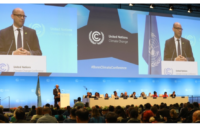Based in Copenhagen, Jacob oversees reporting from Denmark, Iceland, Greenland and the Faroe Islands. Specializes in security and geopolitics in the Arctic and Baltic Sea regions, as well as large corporates such as brewer Carlsberg and shipping group A.P. Moller-Maersk. His most impactful reporting on Arctic issues include a report on how NATO allies are slowly waking up to Russian supremacy in the region, uncovering how Greenland represents a security black hole for Denmark and its allies, and how an abundance of critical minerals has proven a curse for Greenland.
Before moving to Copenhagen in 2016, Jacob spent seven years in Moscow covering Russia’s oil and gas industry for Dow Jones Newswires and The Wall Street Journal, followed by four years in Singapore covering energy markets for WSJ and Reuters. As a Russian speaker, he has been involved in covering the war in Ukraine. He publishes a newsletter each weekday focused on the most important regional and global news. Contact Jacob via email if you are interested in receiving the newsletter.
Maersk warns of slower demand for container shipping
COPENHAGEN, Aug 4 (Reuters) – Shipping group A.P. Moller-Maersk (MAERSKb.CO) warned on Friday of a steeper decline in global demand for shipping containers by sea this year, prompted by muted economic growth and customers reducing inventories.
The company, one of the world’s biggest container shippers with a market share of around 17%, said it expects container volumes to fall by as much as 4%. It had previously forecast a decline of no more than 2.5%.
Maersk transports goods for retailers and consumer companies such as Walmart, Nike and Unilever, and is seen as a barometer for global economic and corporate health.
CEO Vincent Clerc said he saw no sign that the destocking which has curbed global trade activity would end this year.
“We had expected customers to draw down inventories around the middle of the year, but so far we see no signs of that happening. It may happen at the beginning of next year,” Clerc said at a media briefing.
“Consequently, the uptick in volumes we had expected in the second half of the year has not occurred,” he said.
He predicted that the drawdown of inventories would take longer in the U.S. than in other regions.
Maersk posted record earnings last year due to high freight rates caused by strong consumer demand and pandemic-related logjams at ports. But freight rates have tumbled this year amid a global economic slowdown.
FILE PHOTO-Signage is seen at the Maersk offices in Copenhagen, Denmark, July 30, 2022. REUTERS/Andrew Kelly/File Photo
To make things worse for the industry, a wave of hundreds of new container vessels ordered during the pandemic has started to come to market this year.
“Most of the orders are still in the shipyard, so we have a long haul in front of us,” said Clerc.
The industry has been disciplined in handling the new capacity, which has so far prevented a larger plunge in freight rates, he said.
“Whether that will continue, only time will tell,” he said. “We will need to adapt to the new market situation over the next 18 months.”
The company said the number of containers it loaded onto ships between April and June fell by 6% from a year earlier, while average freight rates halved.
Maersk on Friday posted a slightly smaller than expected drop in second-quarter earnings and narrowed its profit forecast for the year.
Earnings before interest, tax, depreciation and amortisation (EBITDA) fell to $2.91 billion in the quarter from $10.3 billion a year earlier, beating analysts’ expectations of $2.41 billion in a Refinitiv poll. Revenues fell 40% to $13.0 billion.
It now expects underlying EBITDA of between $9.5 billion and $11 billion, against previous predictions of between $8 billion and $11 billion.
Reporting by Jacob Gronholt-Pedersen; editing by Terje Solsvik, Jacqueline Wong and Jan Harvey
Our Standards: The Thomson Reuters Trust Principles.
[ad_2]
Source link


